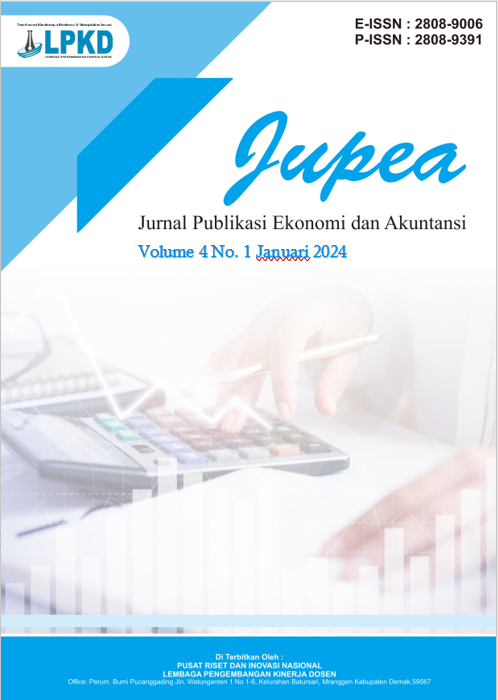Dari Herbal ke Hijau: Praktik Akuntansi Keberlanjutan di PT Sido Muncul Tbk dalam Era Green Economy
DOI:
https://doi.org/10.51903/jupea.v5i2.3921Keywords:
sustainability accounting, green economy, PT Sido Muncul, GRI reporting, IFRS S1/S2Abstract
This article examines the sustainability accounting practices implemented by PT Industri Jamu dan Farmasi Sido Muncul Tbk in supporting the transition to a green economy through a literature study approach. This study relies on literature analysis of the company's 2024 sustainability report documents and academic references related to the concept of a green economy and sustainability reporting. The main objective of this study is to explore how Sido Muncul integrates economic, social, and environmental aspects into its business practices in accordance with the Global Reporting Initiative (GRI) and IFRS Sustainability Disclosure Standards (S1 and S2). The results of the analysis show that Sido Muncul has succeeded in implementing a comprehensive sustainability strategy through energy efficiency, emission reduction, use of local raw materials, and community empowerment. This article concludes that literature studies are an effective method for evaluating a company's sustainability accountability and assessing its contribution to sustainable development goals (SDGs).
References
Anwar, M. (n.d.). GREEN ECONOMY SEBAGAI STRATEGI DALAM MENANGANI MASALAH EKONOMI DAN MULTILATERAL.
Bocken, N. M. P., Short, S. W., Rana, P., & Evans, S. (2014). A literature and practice review to develop sustainable business model archetypes. Journal of Cleaner Production, 65, 42–56. https://doi.org/10.1016/J.JCLEPRO.2013.11.039
Burritt, R. L., & Schaltegger, S. (2010). Sustainability accounting and reporting: Fad or trend? Accounting, Auditing & Accountability Journal, 23(7), 829–846. https://doi.org/10.1108/09513571011080144
Countries to debate restriction on chemicals as pollution crisis mounts. (n.d.). Retrieved May 1, 2025, from https://www.unep.org/news-and-stories/story/countries-debate-restriction-chemicals-pollution-crisis-mounts
Daus, Y. V., Yudaev, I. V., Taranov, M. A., Voronin, S. M., & Gazalov, V. S. (2019b). Reducing the costs for consumed electricity through the solar energy utilization. International Journal of Energy Economics and Policy, 9(2), 19–23. https://doi.org/10.32479/ijeep.7201
Dewi, N. K. R. S., & Sudana, I. P. (2024b). Mekanisme Corporate Governance pada Sustainability Reporting. E-Jurnal Akuntansi, 34(3), 639. https://doi.org/10.24843/eja.2024.v34.i03.p07
Ezquerro, L., Coimbra, R., Bauluz, B., Núñez-Lahuerta, C., Román-Berdiel, T., & Moreno-Azanza, M. (2024). Large dinosaur egg accumulations and their significance for understanding nesting behaviour. Geoscience Frontiers, 15(5). https://doi.org/10.1016/j.gsf.2024.101872
GRI - Home. (n.d.). Retrieved May 1, 2025, from https://www.globalreporting.org/
Hahn, R., & Kühnen, M. (2013). Determinants of sustainability reporting: a review of results, trends, theory, and opportunities in an expanding field of research. Journal of Cleaner Production, 59, 5–21. https://doi.org/10.1016/J.JCLEPRO.2013.07.005
Indonesian Journal of Sustainability Accounting and Management. (n.d.). Retrieved May 1, 2025, from https://ijsam.org/index.php/ijsam
JABI (Jurnal Akuntansi Berkelanjutan Indonesia). (n.d.). Retrieved May 1, 2025, from https://openjournal.unpam.ac.id/index.php/JABI
Jankalová, M., & Jankal, R. (2024a). Review of Sustainability Accounting Terms. Administrative Sciences, 14(7). https://doi.org/10.3390/admsci14070137
KIlay, T. N., Amelia Josefien Viotty Radianto, Ribka Shintia Febriarti Bonara, Joshua Stevanus Poceratu, & Vilencia Christin Salakory. (2024a). ANALISIS PENGUNGKAPAN CSR PADA PT INDUSTRI JAMU DAN FARMASI SIDO MUNCUL TBK. Jurnal Riset Akuntansi Aksioma, 23(1), 150–164. https://doi.org/10.29303/aksioma.v23i1.306
Loiseau, E., Saikku, L., Antikainen, R., Droste, N., Hansjürgens, B., Pitkänen, K., Leskinen, P., Kuikman, P., & Thomsen, M. (2016). Green economy and related concepts: An overview. Journal of Cleaner Production, 139, 361–371. https://doi.org/10.1016/J.JCLEPRO.2016.08.024
Lozano, R. (2015). A Holistic Perspective on Corporate Sustainability Drivers. Corporate Social Responsibility and Environmental Management, 22(1), 32–44. https://doi.org/10.1002/CSR.1325’))
Mutiha, A. H. (2023a). Sustainability Reporting in Indonesia: A Content Analysis of Disclosure (pp. 247–254). https://doi.org/10.2991/978-2-38476-132-6_23
Pt, I., Jamu, D., Farmasi, S., & Muncul, T. (n.d.). Laporan Keberlanjutan Sustainability Report TUMBUH HARMONIS MENUJU KEBERLANJUTAN Harmonious Development towards Sustainability.
PT Industri Jamu Dan Farmasi Sido Muncul Tbk. (n.d.). Retrieved May 1, 2025, from https://www.sidomuncul.co.id/id/home.html
PT. Industri Jamu dan Farmasi Sido Muncul Tbk [SIDO] | IDNFinancials. (n.d.). Retrieved May 1, 2025, from https://www.idnfinancials.com/sido/pt-industri-jamu-dan-farmasi-sido-muncul-tbk?.com
Rongwei, X., & Xiaoying, Z. (2020). Is financial development hampering or improving the resource curse? New evidence from China. Resources Policy, 67, 101676. https://doi.org/10.1016/J.RESOURPOL.2020.101676
Shahzad, M. F., Xu, S., Lim, W. M., Yang, X., & Khan, Q. R. (2024). Artificial intelligence and social media on academic performance and mental well-being: Student perceptions of positive impact in the age of smart learning. Heliyon, 10(8). https://doi.org/10.1016/j.heliyon.2024.e29523
UNEP - UN Environment Programme. (n.d.). Retrieved May 1, 2025, from https://www.unep.org/
Zhang, W., Xu, M., Feng, Y., Mao, Z., & Yan, Z. (2024). The Effect of Procrastination on Physical Exercise among College Students—The Chain Effect of Exercise Commitment and Action Control. International Journal of Mental Health Promotion, 26(8), 611–622. https://doi.org/10.32604/ijmhp.2024.052730
Downloads
Published
Issue
Section
License
Copyright (c) 2025 Jurnal Publikasi Ekonomi dan Akuntansi

This work is licensed under a Creative Commons Attribution-ShareAlike 4.0 International License.







